- Home
- Adam Thorpe
Between Each Breath Page 25
Between Each Breath Read online
Page 25
‘Did you say that? He must have good English.’
‘No, I’d made huge advances with my Estonian. Tuletikk. Rebane.’
‘What’s that mean?’
‘Matches. Fox. The really embarrassing thing, Mill, is I completely forgot about it, after not being able to get it back on. It’s OK, it’s in my bumbag,’ he hastily added, because Milly was looking very anxious. The ring was incredibly expensive, he knew that, although it looked like any other gold ring. ‘I’ll ask at a jeweller’s or something.’
‘You just need to heat it up,’ she said. ‘And use some Vaseline.’
‘Sounds fun,’ he said, grinning.
Six years on, he was up in his study, stretched out on the sofa, turning the ring around and around on its finger, noting the minuscule scratches on its lustre. It was as if nothing had developed since that meal. That moment. As if life was just a whole load of parallel times, running a marathon with each other.
He looked through what he’d composed a week before. At first glance he winced, but by the end of the two minutes of scribbled score it was singing to him, he was on its level. He’d reconceived this whole piece – maybe half an hour long – as something for a lot of woodwind, perhaps mostly saxophones and intermittent percussion and, quietly above it all (their playing would be generally pianissimo, the poor sods!), a baroque violin. Now he was hearing it again as voices, and he added a line for a mechanical bleeper. He scrawled a title on the first sheet: Life is a Trip Hazard, then pulled a face and put a line through Life is a and wrote Waters of the. That was more in keeping with his general style, although Howard claimed all Jack Middleton’s titles sounded like something off a King Crimson album (this was confusing, because Howard was nuts about King Crimson).
Waters of the Trip Hazard evolved back into a choral work during what remained of the afternoon, half of which Jack spent slumbering under his papers.
Each time he woke up he saw the quote from John Cage he’d stuck up on the wall above the photo of himself receiving the Ernst von Siemens Prize over twenty years ago: ‘Pay attention, but stop short of explanation.’ The paper was yellowing and the ink faded, because he’d written it out when he was still a student.
He had not heeded its advice one little bit.
Yes. The easiest thing, aside from going to the Estonian Embassy and finding out, possibly, that she wasn’t even registered and therefore an illegal immigrant, was to give her money. That was obviously what she wanted; why, otherwise, take over five years to get hold of him? She hadn’t answered that question. He was maybe the father. He’d prefer a DNA test before committing himself: he’d met his maybe son – unknowingly, the best test of all – and felt no paternal impulse whatever. He’d read about these things, these scams. Even now, he felt abstracted from the possibility that he was, at long last, a dad. He’d throw money at her, maybe on a regular basis, in return for leaving him be. Whether Jaan was his blood or not.
The only snag was that Milly and he had a shared bank account and that she, being that sort of person, kept a close eye on it. He had looked up rents for rooms on the North Circular and reckoned they averaged around £60 a week. One would have to add £30 or £40 to that for anything halfway decent for two people. Assuming Kaja was earning money somehow (waitressing, he supposed), but having only the vaguest idea of what that might be from his enquiries in a couple of local bars (he realised there was a lot of underpaying in this country), he calculated on giving a boost to her income of around £50 a week – if it were to make any difference. That, he reckoned, was about what she’d be happy with.
Milly would notice that, he was sure. This annoyed him. The more he thought about it, the more he realised how dependent on her he was, financially speaking. He earned peanuts from his commissions and odd bouts of conducting or performance, and had not really bothered with snuffling for awards. The one impressive prize he’d got – the Simonetti Prize for Contributions to New Music – was mainly thanks to Milly’s City brother, the awful Philip, who’d been owed a favour by the most influential member of the three-person prize panel.
This had never troubled him much before: it was good not to be constrained by the idea that one lived by one’s art. Now the idea of living by one’s art, counting the pennies gained from the most meagre commission, like a jazz artist in a bedsit, struck him as rather noble and even effective. Which German composer had noted his monthly earnings down to the last schilling? He couldn’t remember, but it was a big one. Nothing concentrates the mind better than the thought of imminent poverty. Which is why (quite unjustifiably, given his own position) he had no respect for composers with weighty professorial posts. It seemed to him cheating in some way. Yet they were the ones who dictated everything, like the career-culture middlemen, the consultants and glorified accountants, fat on lottery cash.
Milly had at least saved him from the humiliation of music-in-education, of touting himself around grot schools outside Huddersfield or Bradford or somewhere he was equally ignorant of, banging on a triangle as part of some whizzo arts-for-everyone scheme. The very thought made him shudder. Let them see the white clouds for themselves, as he had done. Let them make their own way out of the grot.
Milly arrived back in the middle of the news, in the middle of another car bomb in Iraq, in the middle of scattered clothes and shoes and people running about shouting in dust or smoke. She was exhausted after a day in Dartington. ‘Oh please switch that stuff off,’ she said, so he did so on a shot of a hysterical man cradling his small son spattered in blood, the two of them ghosting his brain as he got her one of the Afghan pouffes. She put her feet up on it in the garden room with Telemann playing on the stereo. After a few minutes she asked for something calm and modern but not Arvo Pärt. He put on Castledown’s latest album. She seemed to approve at first, until its folkish side gave way to something darker.
‘It’s called slow-core,’ said Jack. ‘Or lo-fi. Or nu-folk, even. Not this bit so much.’
‘Let’s try nothing at all,’ she said. ‘I’m feeling like a very fragile habitat.’
‘An alvar,’ said Jack, without thinking.
‘A what?’
‘What? Oh, just this kind of really rare habitat, pebbly, bare rock, very thin soil. Very interesting little plants, moss and lichens and stuff.’
Milly was staring at him. Her drink was making gurgling noises in her chest. This and her expression made her seem very middle-aged, suddenly.
‘Yer wha’?’
‘An alvar. It’s not in the dictionary.’
‘Never heard of it.’
‘Not in the dictionary, I said. It’s practically only in … in the Baltic area.’
‘Estonia?’
‘Um, yeah. Probably Latvia, too.’
‘Alvar.’
‘Yeah.’
‘You saw one for yourself?’
‘Oh, yeah,’ he said, as if surprised she should ask, as if he was one of their dinner-party friends just back from a fortnight in Kenya and asked the same question about elephants or lions.
Her eyes left his face and she drank her Pernod thoughtfully. Alvars were probably only found on Haaremaa, he realised. It was a gaffe. She’d find out. Or maybe she wouldn’t bother. No, of course she wouldn’t trace it back to Haaremaa. There was bound to be an alvar or two on the mainland.
They chatted amiably enough, after a bit. Then the neighbour’s strimmer started up, yet again. Milly, to Jack’s embarrassment, said Fuck and got up and ran out into the garden and yelled at the top of her voice, like someone having a major row, her arms akimbo, spilling her drink.
‘Please, please stop it! Just stop it! Please!’
And the strimmer did, even though they were Albanian. Milly had this way.
A little later she said, just when he wasn’t expecting it, ‘Talking of Estonia, did you phone your bit?’
He laughed, feeling his ears torch and moistness slapped onto his brow like a flannel: ‘Yeah, she wants to sing duets.’
&n
bsp; ‘Seriously?’
‘No, she’s doing her PhD on Pärt’s influences. I mean, people influenced by Pärt. I must have met her at a concert in Tallinn. Terrible, the way you forget people.’
‘Why have you gone all hot and bothered?’
‘Because you’re teasing me, maybe?’
‘Thank God for the weekend,’ she sighed, after looking at him for a moment with anxious eyes. ‘I really feel I’ve done the mileage, this week.’
SIX
They took the train to Basingstoke, where Graham picked them up in the Humber. Graham was a mystery: some thought he was from the Isle of Wight, others (encouraged by Graham himself) from Arizona. He was aged anywhere from thirty-five to sixty, with a wispy ponytail and lined cheeks and a perpetual smell of leathery, slightly manury things overlaid with patchouli. He had a mournful voice and his nickname was Eeyore. Marjorie had found him in a drug-rehab unit, apparently. Without him, it was generally acknowledged that life at Wadhampton Hall would disintegrate.
Daddy du Crane collected vintage cars, apart from the Bentley, and liked to give them an airing; the 1935 Humber had become something of a runabout, despite Milly’s complaints about its fuel consumption. There were no seat belts. The leather seats were scuffed and sagging from seventy years of use and the very heavy doors opened the wrong way.
‘Train OK?’
‘Fine, thanks, Graham. How’s everybody?’
‘I think everybody’s cool, as far as I can figure.’
‘Great. And you?’
‘I’m still trying to figure that one out, yeah.’
Wadhampton Hall was set on a slight rise in the middle of a beech wood, with lawns and paddocks and a large meadow immediately around the house, keeping the trees at bay on three sides. It would normally take five minutes to get from the main gate to the front door by the rather ill-kempt driveway; today it took them fifteen, as the Humber coughed into silence halfway along. They left Graham buried in the engine.
‘We’re coming,’ said Milly, into her mobile. Marjorie was already worried. Jack and Milly loved the walk to the house: the sun was vaguely out and the air was astonishingly fresh, wholesome, and full of foliage.
‘The Heath never smells like this,’ said Jack.
After a while they were too hot, walking, even though it was mid-September. Jack was always inspired by this first contact with the real countryside. The infinite beech wood either side looked as if it had been waiting for them, but it was like a hotel with jammed revolving doors: London took hours to wear off. He’d been playing in his head with an idea that had probably emerged on the train, a semitonal oscillation crossing into something fugue-like in D minor. The trill of the mobile had interrupted it.
‘Squirrel,’ said Milly, pointing. ‘Horrid grey one.’
The Humber purred past as they were about to hit the gravel sweep, the size of three football pitches, in front of the house. They waved, but Graham ignored them. Drum and Bass, the two young slobbery golden retrievers (named by Jack one weekend a couple of years ago), lolloped out to greet them.
‘How odd,’ called out Marjorie, blinking furiously on the top of the steps. ‘Why were you not in the car?’
‘I told you on the mobile, Mummy,’ said Milly.
‘If you think I listen to mobiles,’ Marjorie replied.
But it was worrying, her lapse.
Dinner was just them. Jack was relieved. Even when, instead of the usual clutch of fat-arsed local dignitaries banging on about horses or Romanian fieldworkers, it was a faith-troubled vicar or a bearded leper specialist from India, he found the whole ritual exhausting. For a start, the table was too broad and shiny for comfortable chit-chat; he was never quite sure which fork or glass to start with; and there was always the dreaded question of what he actually did, when he would feel the paltriness of his life’s achievements reflected in the puzzled, even bewildered and often suspicious look on his interlocutor’s face. He generally drank too much of the very good, heady old wine (served by Keith, the jejune young family butler) and ended up saying something a little overenthusiastically. Also, the fresh air of the countryside would always hit him for six at about nine o’clock: he had an overwhelming desire to retire to the large bedroom with the ancient rocking horse and the pop-eyed china dolls on the mantelpiece and slip profoundly into sleep.
He would always sleep well in the Hall, despite its ghosts. Graham, in particular, was in frequent communication with these – being especially close to Lady Felicity du Crane, who tripped and fell against a stone mantelpiece at the age of twenty-five in 1787 and was usually manifested by an abrupt, overpowering smell of lilies in the Orange Room.
‘She’s a very nice woman,’ Graham would say, in his mournful way. ‘A really gentle dude. We get on very well. Call me Felicity, she says, and don’t mind the lilies, it’s what they put in my tomb. OK?’
Jack had sat in an easy chair for three or four hours one night in the Orange Room, ghost-hunting, his attention continually drawn by the unmoving, unchanging stone mantelpiece and its porcelain figurines, but nothing had come of it. He’d scared himself stupid, though. Since then, he was pretty sure that Graham was crazy, and worried about him. He suspected him of having slept with Marjorie, but that was their business. What he didn’t want Graham to do was to take a gun and kill everyone, as a long-ago butler had tried to do before the war. If that felt like a long time ago, it was sometime last week in Wadhampton Hall: although most of the medieval structure had burned to its flagstones in 1606, to be entirely rebuilt by 1627 (only to be bashed about a bit in the Civil War), it still felt very old. Well, it was old. Because it hadn’t changed hands, it was silted up with generational possessions that dramatically telescoped Jack’s sense of history. His toothglass was a George III silver strainer; the chunky bedside tables were late fifteenth century (carried out onto the lawns in 1606); Milly dropped her earrings onto a chipped delftware plate from the 1690s; their bed was a wormholed and lumpily mattressed four-poster apparently graced for one night by the considerable bulk of another King George – which one Milly could never quite remember. And it was uncomfortable, like almost everything in the house. The Victorian cabinets and art deco glass lamps scattered about (there was an arty Lady du Crane two generations back, an intimate friend of Bertrand Russell and Augustus John) were parvenus. Daddy du Crane’s study had an articulated standard lamp like something out of Jules Verne, of whom it was a contemporary. Even the frayed and moth-eaten umbrellas in the hallway stand, with their carved walnut handles, had been operating there for at least a century. The massive valve wireless in the airy breakfast room looked cheekily modern, while what was actually contemporary – the flatscreen television, the smart stereo, the glossy magazines spilling from the day’s Times – lurched into the consciousness like something nightmarish, skulking from history’s daylight.
‘We don’t want to adopt, Mummy. At least not yet.’
They were taking coffee and a succulent old brandy in the morning room, although it was ten o’clock at night: the morning room was used on balmy evenings as it had the nicest ‘give’ onto the garden, as Marjorie put it – in the shape of a large windowed bay. It also had an upright walnut-burred piano, which Jack had been asked to play. He had moved from French variété numbers from the fifties (Marjorie’s favourite, redolent of her wild year in Paris) to Keith Jarrett-style impro. The piano needed tuning but he had drunk enough vintage wines not to care. It had been good enough for Augustus John, apparently. One of the staff had left a bolt spanner on the bass strings and Jack had made a joke about a prepared piano that no one got.
‘Do you go along with this non-adoption thing, Jack?’
‘Yeah, I do.’
He was pressing some great harmonies out of the ivories, letting his fingers enjoy themselves. He could feel the whole room turning into an ECM album cover – a frozen Scandinavian bog with gaunt trees and a leaden sky. The blowing reeds of Haaremaa, silvered by sunlight, long-necked cranes lifting �
�
‘Well I think it’s such a shame,’ said Marjorie. ‘All those orphans in awful places like China. I can understand not wanting Africa, but China’s relatively clean, I believe. Don’t think Aids has hit China, has it?’
‘Mummy, will you please shut up about this subject? I’m here to relax.’
‘What do you think, Richard?’
‘What?’
‘He never listens,’ complained Marjorie. ‘You’re going deaf. I could call you a boring old tosspot and you wouldn’t even react.’
Richard du Crane laughed. ‘That’s because I know I’m a boring old tosspot!’
‘How weak,’ said his wife, whose inability to hold her drink was probably due to age, her physical withering after the cancer. For some reason she got nervous about her daughter’s visits and then overcompensated. ‘You’ve always been terribly weak. Philip’s weak, too. I think it’s interbreeding.’
‘What do you mean by weak, Mummy? Not going off to fight the Crusades?’
Marjorie scowled at her daughter, who knew that her mother had been forbidden to become a bohemian painter at twenty-one and therefore forgave her everything.
‘What are you talking about? Unless you mean this awful bloody Iran business.’
‘Iraq,’ said Richard.
Marjorie ignored him. ‘Very boring, life without children.’
‘There’s still this medical bit of a chance,’ said Milly, staring at the patterns in the threadbare Persian carpet, ‘that something will happen. It’s not at zero. It’ll probably happen when I’ve completely given up hope. But I can’t give up hope.’
Jack coaxed something very gentle, very poignant, from the middle register, working with fourths in A minor, his whole body turning into it because he felt very cool, very relaxed. The garden was puffing scents into the room on the warm night air: mainly jasmine from the gazebo, with hints of beech mast. It was at times like this that he reckoned he’d married well, but also that he missed his unmade children more, and Max most of all.

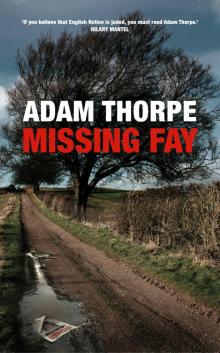 Missing Fay
Missing Fay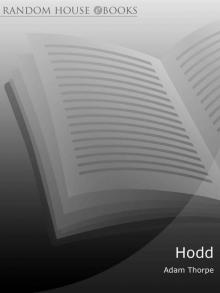 Hodd
Hodd Pieces of Light
Pieces of Light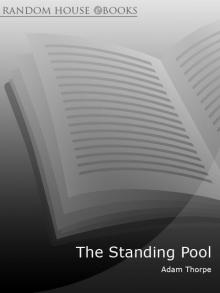 The Standing Pool
The Standing Pool Ulverton
Ulverton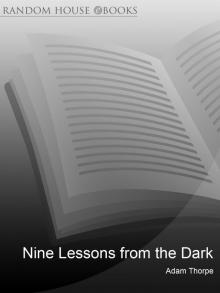 Nine Lessons From the Dark
Nine Lessons From the Dark Flight
Flight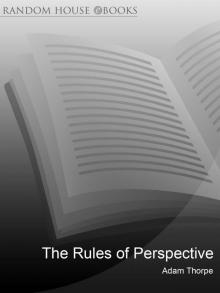 The Rules of Perspective
The Rules of Perspective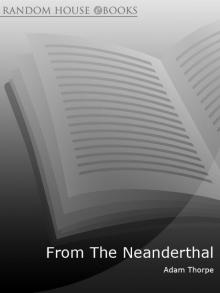 From the Neanderthal
From the Neanderthal Is This the Way You Said?
Is This the Way You Said?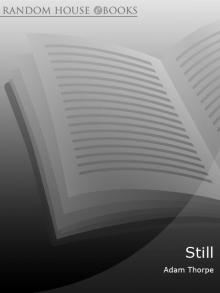 Still
Still No Telling
No Telling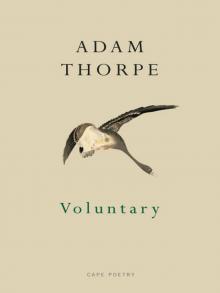 Voluntary
Voluntary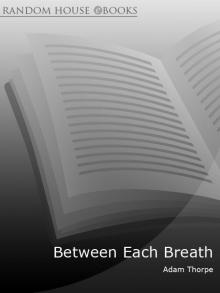 Between Each Breath
Between Each Breath